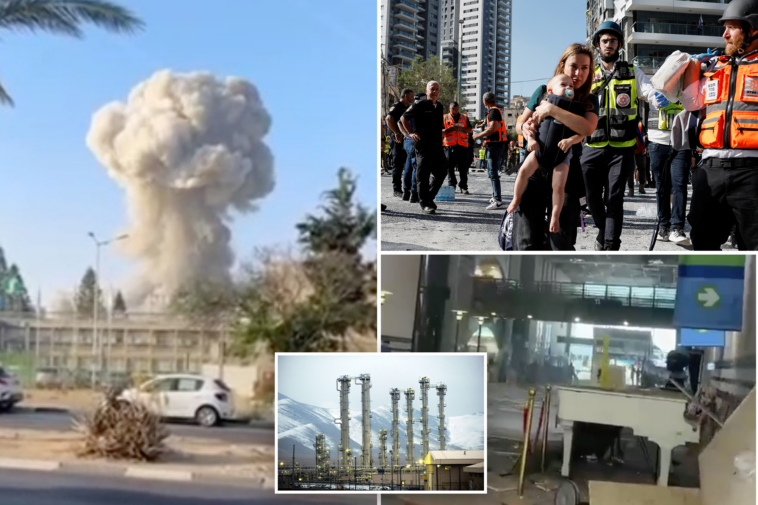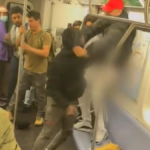Israel struck a key Iranian nuclear site Thursday as Iran blasted dozens of missiles at the Jewish state — striking a key Israeli hospital and injuring scores in an attack described by officials as “the most severe incident of its kind in the history of Israel’s healthcare system.”
The Israeli military said it targeted the Khondab nuclear site near Iran’s central city Arak overnight, striking 100 targets, including a partially built heavy water research reactor.
Meanwhile, several Iranian missiles struck populated areas in Israel in an early morning onslaught, including the Soroka Medical Center in Beer Sheba, the main hospital in southern Israel.
At least 80 were injured and the hospital, which took a direct hit, sustained significant damage, a video taken inside the facility shows.
Around half of the injured were hospital staff members, according to a hospital spokesperson.
“Dozens of ballistic missiles were launched at Israel in the last barrage from Iran, with several hits to civilian population centres (including the Soroka hospital in southern Israel),” an Israeli military official told The Post.
“IDF Homefront Command Search and Rescue teams have been dispatched to several reported impact sites.”
The hospital shut down to new patients — other than those in life-threatening situations — following the strike.
Read the latest on the conflict between Israel and Iran
Israeli Prime Minister Benjamin Netanyahu promised to hit back even harder at Iran following the strike.
“We will exact the full price from the tyrants in Tehran,” he vowed in an X post.
Israel’s defense minister, Israel Katz, backed up Netanyahu’s threat.
“These are war crimes of the most serious kind — and [Iranian Supreme Leader Ayatollah Ali] Khamenei will be held accountable for his crimes,” he tweeted.
“The Prime Minister and I have instructed the IDF to increase the intensity of attacks against strategic targets in Iran and against government targets in Tehran in order to remove threats to the State of Israel and undermine the ayatollahs’ regime.”
The attack came after Israel targeted Iran’s heavy water reactor, according to an Israeli official and Iranian state television.
The Israel Defense Forces had shared an evacuation warning across social media that included a satellite image of the nuclear plant, which sits in the city of Arak, in the middle of a red circle indicating a blast zone.
Every morning, the NY POSTcast offers a deep dive into the headlines with the Post’s signature mix of politics, business, pop culture, true crime and everything in between. Subscribe here!
“Dear citizens, for your safety and well-being, we urgently request that you immediately evacuate the designated area in Tehran’s Area 18. Your presence in this area puts your life at risk,” the IDF Farsi wrote on X.
The facility was fully evacuated before the attack, according to Iran’s state-run station.
Heavy water reactors produce plutonium, which, like enriched uranium, can be used to make the core of an atomic bomb.
Iranian media reported two projectiles hitting an area near the facility, though there were no reports of radiation threats.
The United Nations nuclear watchdog, the International Atomic Energy Agency (IAEA), said it had information that the heavy water research reactor under construction there had been hit, but did not contain radioactive material. It had no information that a separate plant there, which makes heavy water, had been struck.
The site was visited by IAEA inspectors on May 14, just one month before that panel would vote to hold the Iranian regime in non-compliance with nuclear nonproliferation agreements.
Israel’s strikes have already targeted several prominent enrichment sites throughout Iran during the seven days of airstrikes aimed at weakening the regime’s nuclear capabilities — including in the cities Isfahan and Natanz.
The Jewish state has also obliterated top Iranian generals and nuclear scientists, crippling the nation’s ability to respond militarily or diplomatically.
President Trump is weighing the extent to which the United States will enter into the thus far regional conflict.
“Based on the fact that there’s a substantial chance of negotiations that may or may not take place with Iran in the near future, I will make my decision whether or not to go within the next two weeks,” Trump said in a statement read from the White House briefing room by press secretary Karoline Leavitt.
The president will also be receiving intelligence briefings from his National Security Council over the weekend, according to the White House.
Israel has specifically asked for the United States to provide a bunker-busting bomb to take out Iran’s underground nuclear enrichment stronghold in Fordow.
Despite Trump playing it close to the vest so far, three US Navy destroyers are now deployed in the eastern Mediterranean Sea, a show of force that could be intended to intimidate Iran into compliance.
It also potentially positions the US for strikes, depending on what the president decides in the coming days.
Iran’s Supreme Leader Ayatollah Ali Khamenei has vowed the country would not surrender under pressure and warned that the US joining Israel in its bombardments would result in “irreparable damage.”
Iran’s Supreme National Security Council also warned any “third party” considering getting involved in the conflict would be met with an “immediate” response according to a “specific plan,” though details of the plan were not specified.
At least 693 people, including 263 civilians, have been killed in Iran since Israel began its bombing campaign last week, a Washington-based Iranian human rights group said.
In Israel, 24 people have died and hundreds have been wounded by Iranian retaliatory strikes, the Associated Press reported.
European foreign ministers are set to meet with Iranian officials in Geneva, Switzerland, on Friday in hopes of convincing them to de-escalate and roll back their nuclear activities.
With Post wires



